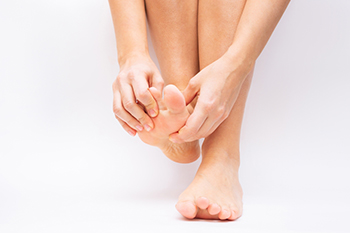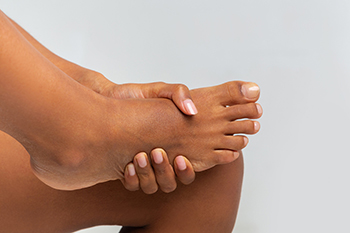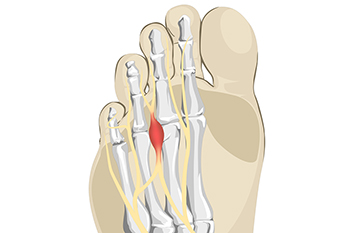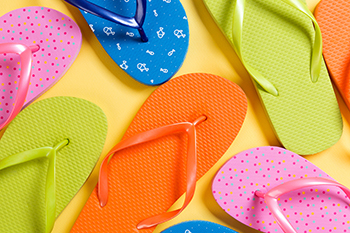Connect With Us
Blog
Items filtered by date: October 2023
Changes in Your Toes May Signal Health Problems

Changes to your toes and toenails can serve as silent indicators of your overall health. They may reveal underlying health issues, such as arthritis, heart disease, anemia, and diabetes. Painful, inflamed toe joints could be a sign of arthritis, including rheumatoid arthritis, osteoarthritis, psoriatic arthritis, or gout. Clubbed toes, characterized by toe enlargement and curving toenails, may suggest lung or heart problems. Toenails that appear scooped out might be linked to anemia or autoimmune disorders. Tingling, burning, or numbness in your toes are common signs of peripheral neuropathy, often associated with diabetes. Be vigilant about changes in your toenails or the appearance of any suspicious moles, as melanoma can also affect your toes. Also, nail bed changes, like half-and-half nails, where half of the nail bed appears white while the other half is a shade of red, pink, or brown, may indicate kidney disease. Washed-out toenails, with white or pale nails and a pink or brown band, can point to liver conditions. These subtle indicators can provide valuable insights into your well-being and for that reason should not be ignored. If you have noticed distinct changes to your toes or toenails, it is suggested that you make an appointment with a podiatrist for an exam and diagnosis.
When dealing with systemic disease of the feet, it is extremely important to check the affected areas routinely so that any additional problems are caught quickly. If you have any concerns about your feet and ankles contact Dr. Eddy Caldwell from Foot Care of Northeast Arkansas, P.A.. Our doctor will assist you with all of your podiatric needs.
Systemic Diseases of the Feet
Systemic diseases affect the whole body, and symptoms usually are displayed in the feet. This condition can make a patient’s ability to walk unbearable. Systemic diseases include gout, diabetes mellitus, neurological disorders, and arthritis.
Gout – is caused by an excess of uric acid in the body. Common symptoms include pain, inflammation, and redness at the metatarsal/phalangeal joint of the base big toe. Gout can be treated by NSAIDs to relieve pain and inflammation, and other drugs that lower the acid levels in the body.
Diabetes mellitus – is an increase in the level of blood sugar that the body cannot counteract with its own insulin. Failure to produce enough insulin is a factor in Diabetes.
Diabetes of the Feet
Diabetic Neuropathy – may lead to damaged nerves and affect the feet through numbness and loss of sensation.
Peripheral Vascular Disease – can restrict the blood flow to the feet, and often times lead to amputation of the feet.
If you have any questions please feel free to contact our office located in Jonesboro, AR . We offer the newest diagnostic and treatment technologies for all your foot and ankle needs.
Erythromelalgia in the Feet

Erythromelalgia is a genetic condition characterized by recurrent bouts of pain, redness, and swelling, primarily in the hands and feet. These episodes are frequently triggered by elevated body temperature, which can result from activities like exercising or being in a warm environment. Consumption of alcohol or spicy foods can also provoke these painful episodes. Oddly enough, even wearing warm socks or tight shoes can induce debilitating foot pain, hindering daily activities like walking, wearing shoes, or functioning normally. The signs and symptoms of erythromelalgia in the feet typically emerge during childhood, although some mildly affected individuals may experience their initial episode later in life. As the condition progresses with age, the redness and discomfort may become chronic, extending from the feet to the entire legs. Erythromelalgia is often classified as a type of peripheral neuropathy, impacting the peripheral nervous system. This system links the brain and spinal cord to muscles and sensory receptors responsible for detecting sensations such as touch and pain. If you think you might have erythromelalgia or any type of foot pain, it is suggested that you make an appointment with a podiatrist for a proper diagnosis and treatment.
Foot Pain
Foot pain can be extremely painful and debilitating. If you have a foot pain, consult with Dr. Eddy Caldwell from Foot Care of Northeast Arkansas, P.A.. Our doctor will assess your condition and provide you with quality foot and ankle treatment.
Causes
Foot pain is a very broad condition that could be caused by one or more ailments. The most common include:
- Bunions
- Hammertoes
- Plantar Fasciitis
- Bone Spurs
- Corns
- Tarsal Tunnel Syndrome
- Ingrown Toenails
- Arthritis (such as Gout, Rheumatoid, and Osteoarthritis)
- Flat Feet
- Injury (from stress fractures, broken toe, foot, ankle, Achilles tendon ruptures, and sprains)
- And more
Diagnosis
To figure out the cause of foot pain, podiatrists utilize several different methods. This can range from simple visual inspections and sensation tests to X-rays and MRI scans. Prior medical history, family medical history, and any recent physical traumatic events will all be taken into consideration for a proper diagnosis.
Treatment
Treatment depends upon the cause of the foot pain. Whether it is resting, staying off the foot, or having surgery; podiatrists have a number of treatment options available for foot pain.
If you have any questions, please feel free to contact our office located in Jonesboro, AR . We offer the newest diagnostic and treatment technologies for all your foot care needs.
Common Foot Injuries Sustained in Falls

Foot injuries resulting from slip and fall accidents are often underestimated but can have long-lasting consequences. Common foot injuries in falls may include strained and sprained ankles, broken ankles requiring surgery, or torn Achilles tendons. Additionally, complex Lisfranc fractures, dislocated toes, crush injuries, and lacerations can occur from falling. While casts, braces, and rehabilitation may help, these injuries can lead to chronic pain, loss of mobility, and other complications in the future. Over time, bone spurs may develop, damaged cartilage may degrade further, and stretched tendons may weaken, causing pain and mobility issues in other areas of the body. If you have sustained an injury to your feet or ankles due to a fall, it is suggested that you make an appointment with a podiatrist.
Preventing falls among the elderly is very important. If you are older and have fallen or fear that you are prone to falling, consult with Dr. Eddy Caldwell from Foot Care of Northeast Arkansas, P.A.. Our doctor will assess your condition and provide you with quality advice and care.
Every 11 seconds, an elderly American is being treated in an emergency room for a fall related injury. Falls are the leading cause of head and hip injuries for those 65 and older. Due to decreases in strength, balance, senses, and lack of awareness, elderly persons are very susceptible to falling. Thankfully, there are a number of things older persons can do to prevent falls.
How to Prevent Falls
Some effective methods that older persons can do to prevent falls include:
- Enrolling in strength and balance exercise program to increase balance and strength
- Periodically having your sight and hearing checked
- Discuss any medications you have with a doctor to see if it increases the risk of falling
- Clearing the house of falling hazards and installing devices like grab bars and railings
- Utilizing a walker or cane
- Wearing shoes that provide good support and cushioning
- Talking to family members about falling and increasing awareness
Falling can be a traumatic and embarrassing experience for elderly persons; this can make them less willing to leave the house, and less willing to talk to someone about their fears of falling. Doing such things, however, will increase the likelihood of tripping or losing one’s balance. Knowing the causes of falling and how to prevent them is the best way to mitigate the risk of serious injury.
If you have any questions, please feel free to contact our office located in Jonesboro, AR . We offer the newest diagnostic and treatment technologies for all your foot care needs.
Are You Suffering From Nerve Damage?
Morton’s Neuroma Symptoms and Treatment

A network of plantar digital nerves in the feet supply sensory signals to the forefoot and toes. Problems arise when these nerves encounter compression, which can occur when the toes are consistently pressed together, effectively obstructing the pathway for these nerves. Such compression often causes a condition known as Morton's neuroma. This may be the result of wearing high heels that force body weight onto the ball of the foot. When the plantar nerves become entrapped, their ability to efficiently transmit signals is affected. This leads to symptoms, including sharp, burning, or tingling sensations in the forefoot and toes. Individuals with Morton's neuroma may also experience numbness or the feeling of having a pebble or foreign object in their shoe. Morton's neuroma can be effectively managed in several ways. Start with footwear that has cushioning and provides adequate room for the toes. Custom orthotics can also help alleviate pressure on the affected area. In more severe cases, corticosteroid injections or surgical intervention may be recommended. If you suspect you are suffering from Morton's neuroma, it's suggested that you make an appointment with a podiatrist for a diagnosis and treatment plan tailored to your needs.
Morton’s neuroma is a very uncomfortable condition to live with. If you think you have Morton’s neuroma, contact Dr. Eddy Caldwell of Foot Care of Northeast Arkansas, P.A.. Our doctor will attend to all of your foot care needs and answer any of your related questions.
Morton’s Neuroma
Morton's neuroma is a painful foot condition that commonly affects the areas between the second and third or third and fourth toe, although other areas of the foot are also susceptible. Morton’s neuroma is caused by an inflamed nerve in the foot that is being squeezed and aggravated by surrounding bones.
What Increases the Chances of Having Morton’s Neuroma?
- Ill-fitting high heels or shoes that add pressure to the toe or foot
- Jogging, running or any sport that involves constant impact to the foot
- Flat feet, bunions, and any other foot deformities
Morton’s neuroma is a very treatable condition. Orthotics and shoe inserts can often be used to alleviate the pain on the forefront of the feet. In more severe cases, corticosteroids can also be prescribed. In order to figure out the best treatment for your neuroma, it’s recommended to seek the care of a podiatrist who can diagnose your condition and provide different treatment options.
If you have any questions, please feel free to contact our office located in Jonesboro, AR . We offer the newest diagnostic and treatment technologies for all your foot care needs.
Flip-Flops May Impact Your Feet

Flip-flops are popular summer footwear, offering ease and comfort on hot days. However, while they may be the preferred choice for many, it is essential to understand how they can affect your feet. The primary concern with flip-flops is their lack of support. They typically offer minimal arch support, and the thin sole provides little cushioning. This can lead to overuse injuries such as plantar fasciitis and Achilles tendonitis, as well as discomfort and fatigue during extended wear. Many flip-flops also have a lack of protection. Flip-flops expose your feet to hazards such as sharp objects, extreme heat, or slippery surfaces. This can result in cuts, burns, or accidents. Additionally, flip-flops often require a gripping motion of the toes to keep them in place, potentially leading to strain or imbalance in the foot's muscles. While flip-flops are perfect for short, casual outings, they should not be your primary footwear choice for long walks or activities that demand proper foot support and protection. Choosing shoes with better arch support and cushioning can help safeguard your feet against potential discomfort and injuries. If you would like more information about the negative effect wearing flip-flops can have on your feet, it is suggested that you speak with a podiatrist.
Flip-flops can cause a lot of problems for your feet. If you have any concerns about your feet or ankles, contact Dr. Eddy Caldwell from Foot Care of Northeast Arkansas, P.A.. Our doctor will assist you with all of your foot and ankle needs.
Flip-Flops and Feet
Flip-flops have managed to become a summer essential for a lot of people. While the shoes may be stylish and easy to slip on and off, they can be dangerous to those who wear them too often. These shoes might protect you from fungal infections such as athlete’s foot, but they can also give you foot pain and sprained ankles if you trip while wearing them.
When Are They Okay to Wear?
Flip-flops should only be worn for very short periods of time. They can help protect your feet in places that are crawling with fungi, such as gym locker rooms. Athlete’s foot and plantar warts are two common fungi that flip-flops may help protect your feet against.
Why Are They Bad for My Feet?
These shoes do not offer any arch support, so they are not ideal for everyday use. They also do not provide shock absorption or heel cushioning which can be problematic for your feet. Additionally, you may suffer from glass cuts, puncture wounds, and stubbed toes since they offer little protection for your feet.
More Reasons Why They Are Bad for Your Feet
- They Slow You Down
- May Cause Blisters and Calluses
- Expose Your Feet to Bacteria
If you have any questions, please feel free to contact our office located in Jonesboro, AR . We offer the newest diagnostic and treatment technologies for all your foot care needs.






